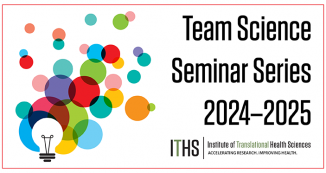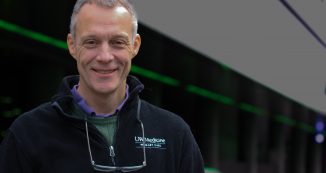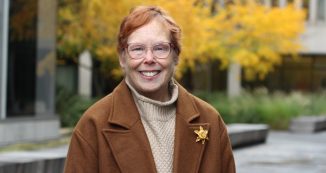
24 Feb Research Stories from the Region: Dr. Jimenez on Being Open to Change
There is nothing more exciting at ITHS than when we help researchers succeed. Every year we assist dozens of investigators no matter what stage they are at in their research. We help knowing that there are many more researchers out there that need a hand, but who might shy away from knocking at our door. Maybe it was not the right time, their plans took an unexpected turn, or maybe they just weren’t ready to open up about their study and see it change.
Whatever the reason, know that we will always be here, ready when you are. In the meantime, take a look at Dr. Nathalia Jimenez’s story. It might sound familiar: an investigator who submitted a research study with a lot of potential, one she felt very passionate about, but which still did not get accepted for funding. If this has happened to you, or if you don’t want this to happen to you, read on!
One of our most successful programs at ITHS is Community Engagement (CE), co-directed by Dr. Linda Ko. Through this program, we are committed to facilitating community-academic research partnerships in eastern Washington, Wyoming, Alaska, Montana and Idaho (WWAMI) that are true collaborations. We aim to increase community involvement in every stage of research. We promote research that will address the priorities and health outcomes of the communities and practices we work with.
Our main focus is to provide tools, knowledge, skills, and institutional support to advance discovery into practice. This is the area where Nathalia Jimenez, MD, MPH, needed a little bit of help. Dr. Jimenez is an Associate Professor and Vice Chair of Equity, Diversity & Inclusion for the Department of Anesthesiology and Pain Medicine at the University of Washington (UW), and an Investigator at the Center for Child Health Behavior and Development at Seattle Children’s Research Institute, and Affiliate Faculty with the UW Latino Center for Health. So, you would think Dr. Jimenez couldn’t possibly need help developing a study. The reality is that at some point, we all need a little bit of help, especially when it comes to submitting a study for a competitive 1R01 award.
We asked Dr. Jimenez a few questions to learn about her study, 1st Brain Injury Education and outpatient Navigation (1st BIEN), and how it went from being rejected the first time she submitted it to being awarded a 1R01 for a total amount of $3,901,688, after receiving help from the ITHS CE program.
How did you first learn about ITHS and its Community Engagement program?
A colleague from the University of Washington, Dr. Leo Morales, introduced me to Dr. Linda Ko. Through Dr. Ko I became familiar with the CE program.
Tell me a little bit about your study? What’s it about?
The 1st BIEN study is an RCT [randomized control trial] that tests the efficacy of a bicultural and bilingual behavioral intervention for Latinx parents of children with traumatic brain injuries (TBI).
This intervention was informed by a series of quantitative studies documenting long-term disparities in disability after TBI among Latinx children, and receipt of rehabilitation services. It is also informed by Latinx parents/caregivers and the clinicians who cared for them.
We conducted a series of focus groups and in depth interviews in which we confirmed barriers to access care and gaps in the understanding of TBI and its treatments combined with a lack of educational and informational materials culturally in linguistically relevant for these families.
As an anesthesiologist, I am acutely aware of some of the barriers that families experience when navigating our complex health care system. If you add to this the stress of caring for a child who abruptly had a change in their health due to the traumatic brain injury and who, as a result of this injury, may have new physical and/or cognitive disabilities – and in a language in which you are not completely fluent, you can understand how families may struggle when reintegrating to the community after discharge from the hospital.
What excites you about doing this study?
What excites me about this study is that our intervention supports families during a critical time in their treatment. It provides equitable care by addressing the educational and support needs of Latinx families. Our study goes beyond addressing disparities in care to actually trying to solve them, in a patient and family centered way.
What were the challenges you were experiencing when you first submitted the study for funding?
One of the challenges we had was the lack of a behavioral scientist that could help us to better conceptualize the intervention. I knew from my prior work with Latinx families what were needs and based on those needs, we developed an intervention that provided education about traumatic brain injuries and support during transitions of care by a patient navigator. However, the two components of the intervention lacked cohesiveness.
What made you decide to reach out to ITHS CE?
After our first submission it was evident that we needed the knowledge and guidance of an expert interventionist behavioral scientist. I was familiar with Dr. Ko’s work, her expertise not only as a trialist and interventionist, but also her experience working with Latinx communities was exactly what our study needed.
How do you think CE helped you and your study to get funded? What were you doing now differently that you weren’t doing previously as it relates to the study?
When I met with Dr. Ko, she immediately recognized the need to ground this work on a conceptual behavioral model that covered the two aspects already recognized by our team, plus additional aspects that were missing and that were essential to provide a comprehensive and more cohesive approach.
Two parts of the study changed significantly, the first one, as I mentioned before, was the utilization of a behavioral conceptual model that brought cohesiveness to the intervention and added pieces that were missing before. The second one was a better definition of some of the intermediate outcomes.
Do you have any advice for other researchers out there like yourself on CE services or your experience as a researcher? Any best practices you’d like to share that you think would help others like you?
My advice is to be open to being helped and to be open to change. I made important changes after the first submission; it required time and effort, but it completely paid off.
ITHS congratulates Dr. Jimenez for her formidable work in this field of study. Her award is proof of her courage to change and her relentless approach to following her path. This important study will help to better understand some of the many research needs within the Latinx community. Like we say in Spanish: ¡En hora buena, Nathalia! (Congratulations!)








